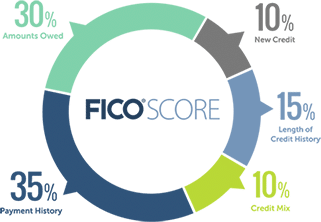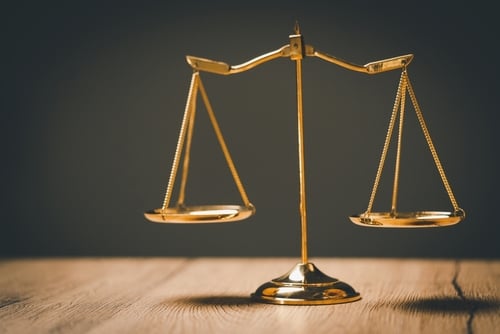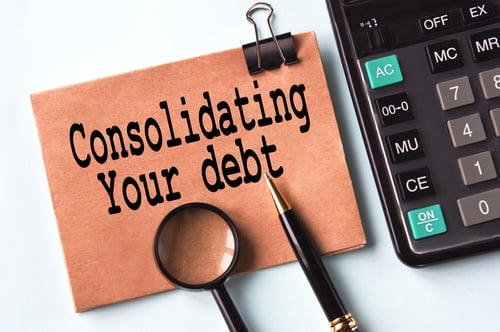United Settlement / Credit Card Debt / Credit Card Guide / How To improve Your Credit Score
How To improve Your Credit Score
Credit scores are a widely accepted and efficient tool utilized by lenders to determine the overall credit worthiness of a potential borrower. Credit scores are found on credit reports produced by the three major credit bureaus – Equifax, Experian and TransUnion – and they serve as a comprehensive review of an individual’s debt repayment history as it relates to credit cards, mortgages, student loans and other debts.
Establishing a strong credit score and favorable credit history that speaks to responsible debt repayment places you in position to secure further debt at favorable terms from subsequent lenders. Conversely, a weak credit score and poor credit history can work against you when pursuing additional debt, and can reflect poorly upon you when landlords and potential employers see your score on your credit report.

FICO Credit Scores
FICO scores, created by the Fair Isaac Corporation, range from 300-850 and are utilized by many lenders. FICO scores above 700 are considered good, with scores above 740 considered excellent. As an individual assumes more credit, FICO credit scores fluctuate to reflect repayment of credit card debt and other debts including student loans, auto loans and mortgages.
Establishing a strong credit profile through consistent timely payments and a relatively low credit utilization ratio will lead to a higher score, while late payments, delinquent accounts, defaulted loans and a higher credit utilization ratio will lead to a lower credit score. With the average FICO score coming in at a healthy 699 in 2016, a score in the low 600s or below is considered less enticing by many lenders and can result in higher interest rates and other unfavorable terms for the borrower.
Over the long term, a weak credit score can lead to thousands of dollars in excess interest expense and a significantly longer duration of debt repayment. The good news is that there are steps that you can take to elevate your credit score and borrowing profile to help turn things around.

Review Your Free Credit Reports
For starters, it is a good idea to periodically review your credit report to ensure it remains an accurate reflection of your debt repayment history. If you do spot any inaccuracies, contact the appropriate credit bureau and initiate a dispute if necessary. When you order your own credit report or check your FICO score online through a credit card company that provides this benefit, there will be no adverse impact on your credit score. There are two ways to request free copies of your credit report.
Request a free credit report from each of the three national credit reporting bureaus – Experian, Equifax and TransUnion. You will have the opportunity to receive a free copy from each bureau every twelve months. Accordingly, it can be a good idea to stagger your free reports throughout the year, rather than requesting all three reports at the same time.
Manage Your Credit Utilization Ratio
Next, resist the temptation to close out credit cards or other available lines of credit to which you have access but don’t currently use, as your credit score will go down if you do this. Very importantly, your credit score is in part determined by your credit utilization ratio – that is, the percentage of available credit that you have actually borrowed.
The higher the credit utilization rate, the lower your credit score. Therefore, keeping unused available credit lines open will lower your credit utilization rate, and this is a good thing for your overall credit score and profile
Now, if your credit utilization ratio is high in spite of the fact that you’ve been making a concerted effort to pay down credit card debt while also spending less, there are two steps you can take. First, call your creditors and ask for an extension of your existing credit lines, even though you have no intention of using it. Why? Because raising your available credit lines will lower your credit utilization ratio and raise your credit score.
Similarly, you can also apply for an additional credit card, even though you have no intention of using it. Getting an additional card will also raise your total available credit, lower your credit utilization ratio, and raise your credit score. The absolute essential aspect of either of these strategies is to maintain the discipline not to tap into either of these extended credit line scenarios. Accordingly, if you think you may lack the self-discipline required here, you should not attempt either of these approaches.


More Ways to Raise Your Credit Score
Because credit scores and profiles are built over time – they in fact represent a history of established repayment behavior – improving a damaged credit score results after a steady rebuilding process that also takes place over time. Begin enhancing your credit profile by making timely payments in a consistent manner. This is the simplest, most direct way to demonstrate reliability while also reducing your debt load, especially when you get into the habit of paying more than the monthly minimum.
If your budget (you do have a written budget detailing monthly cash inflows and necessary expenses, don’t you?) still includes non-necessities such as high-end clothing, expensive restaurant meals and/or high-priced sporting and entertainment events, it’s time to cut back and pay down more of your debt. Cutting superfluous spending in favor of reducing credit card debt and associated interest expense may not be as much fun, but it will serve you well in the long run as your debt decreases and credit score heads higher.
If you’ve got multiple accounts that are a challenge to keep track of month after month, setting up monthly payment reminders are an easy way to insure you continue making consistent timely payments. You may even want to consider paying twice a month on some cards, as this will lower your credit utilization level and raise your score. However, if money remains tight and this is not an option, consider taking a part-time job with flexible hours in the restaurant or retailing industries to enhance your ability to pay off debt faster. If this is unrealistic due to family responsibilities or other constraints, you may want to consider enrolling in a debt management plan.
Debt Management Plans
A debt management plan (DMP) is a common solution for individuals who are carrying too much unsecured credit card debt and are having difficulty paying bills to a number of different creditors each month. A reputable credit counseling agency can structure a DMP for you in which you make one streamlined payment each month to the counseling agency, who in turn allocates funds to your various creditors.
All accounts included in a DMP become inactive, and the closing of these accounts will temporarily negatively impact your credit score. However, a DMP will result in a lower blended monthly interest rate and monthly payment while giving you the opportunity to demonstrate a consistent payment history. This will rebuild your credit profile, raise your credit score and even get you out of debt over a three- to five-year time period.
Become an Authorized User
Becoming an authorized user on someone else’s credit card account can be a surprisingly effective approach to significantly enhancing your credit score – provided the account you get added to as an authorized user remains in good standing and is managed responsibly. The essential element here is that both parties in this situation must act responsibly, because all borrowing and repayment behavior becomes incorporated into the credit reports and credit scores of both individuals.
The typical arrangement here may involve a spousal relationship or a very close, trusted friend. Regardless, if the person on the account to which you are added already has a strong credit profile and generally demonstrates responsible repayment, your credit score and profile will become enhanced by that individual’s continued good behavior.
On the other hand, make sure you don’t attach yourself to an irresponsible debtor, as this will only hurt your credit score – any late payments and excess borrowings will impact your profile – even if you aren’t responsible for them. And by no means should you pursue this approach if you would potentially harm the credit profile of the person who grants you user authorization.
What if I Don't Actually Have Credit Yet?
The simplest way to get started is to apply for a low limit credit card and to pay your bill on time each month. If you have been unable to secure a traditional credit card, try getting approved for a department store or gas station credit card instead. Alternatively, you may want to consider applying for a secured VISA credit card, one in which you deposit money into a savings account and the card is then used for purchases up to the amount of your deposit. This is an excellent way to begin the process of establishing or rebuilding credit. Regardless of the type of card you get, be sure to use it responsibly and pay your bills in a consistent, timely manner.
How to Improve Your Credit Score
FAQs
If the bill in question comes from your doctor, and you know your doctor reasonably well, try working out a payment plan. Alternatively, if you have an emergency fund set aside, inquire as to whether the office would accept a reduced settlement lump sum payment in cash. You can also offer to pay a similar amount to what your doctor accepts from major medical insurance companies for similar treatment. If you’re dealing with a hospital bill, contact the billing office and have every charge fully explained to you. No detail on a hospital bill is too small – be fully thorough in your questioning, as this is the best way to guard against any potential billing errors and fraud. If you spot any expensive procedures listed on your hospital bill to which you don’t recall consenting, dispute them with the billing office.
FICO scores, created by the Fair Isaac Corporation, range from 300-850 and are utilized by many lenders. FICO scores above 670 are considered good, with scores above 740 considered excellent.
The VantageScore, which was developed by the three major credit bureaus (Experian, Equifax and TransUnion), also uses a range of 300-850, with scores above 700 considered good and scores above 750 considered excellent.
There are two ways to request free copies of your credit report. Visit https://www.annualcreditreport.com to request a free credit report from each of the three national credit reporting bureaus – Experian, Equifax and TransUnion. At the above website, you have the opportunity to receive a free copy from each bureau every twelve months. Accordingly, it can be a good idea to stagger your free reports throughout the year, rather than requesting all three reports at the same time. You can also request free copies of your credit report by calling 888-574-5454
It is a good idea to periodically view your credit report to ensure it remains an accurate reflection of your debt repayment history. If you do spot any inaccuracies, contact the appropriate credit bureau and initiate a dispute if necessary.
When you order own credit report or check your FICO score online through a credit card company that provides this benefit, there will be no adverse impact on your credit score. However, there can be a mild negative impact to your score if you apply for more than one line of credit within a short period of time.
Late credit card payments will typically remain on your credit report for seven years. For this reason, it is always important to pay your credit card bills in a timely manner each month. For those considering bankruptcy, you should know that a bankruptcy filing will remain on your credit report for ten years.
Above all, get into the habit of consistently paying your bills in a timely manner. If you’re having difficulty making payments, contact your creditors to work out a payment plan or consult with a reputable credit counseling service who can help structure a debt management plan or other viable solution appropriate to your specific financial situation.
If you’re not having difficulty making payments, then work to decrease your total debt load relative to your aggregate available credit lines. Lowering your debt utilization ratio will help raise your credit score. Additionally, you should periodically verify that your credit reports do not include any inaccuracies that may be harming your credit score.
Get Debt Relief
Speak with licensed debt specialists dedicated to guiding you toward financial stability every step of the way.

Ready To Get Started?
See if you qualify for debt relief. Get a Free savings estimate to see how quickly you can be debt free.
Embrace financial freedom with our tailored solutions, expert guidance, and unwavering commitment to your success.
Experienced Professionals
Our experienced team has helped thousands of clients successfully eliminate debt and regain financial freedom.
Customized Solutions
We know every financial situation is different, so we design personalized debt relief plans to fit your specific needs and goals.
High Success Rate
Our proven debt relief strategies deliver real results. With a strong track record of success, we help clients achieve lasting financial stability.
Confidential Consultation
Your privacy is our priority. All debt relief consultations are 100% confidential and handled with the highest level of discretion.
Explore other blogs











